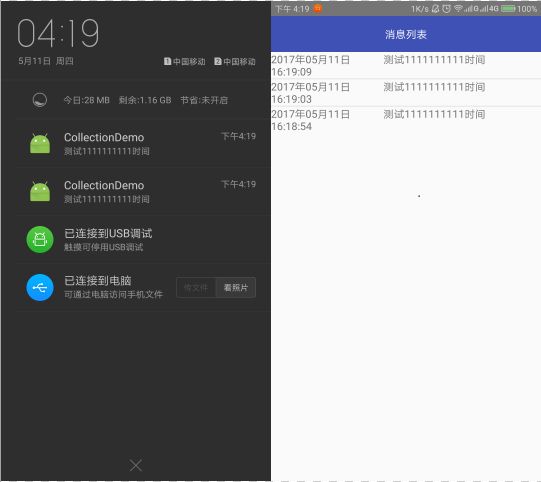缓存的方式有多种,最常用的类似搜索记录,这些用的数据库比较多。
本文用的是一个数据库框架GreenDao,正好也练习一下。
关于技术部分需要的操作也不是太多,无非包括两部分:
一部分是在接到推送的消息的时候缓存,另一部分是在页面的时候将消息展示出来。
但是有个缺点,数据清除了之后,除非自己去后台查看记录,不然就被清理掉了。
源码在GitHub如果有介绍不清楚的地方以去查看
https://github.com/wapchief/android-CollectionDemo
关于GreenDao的介绍这里就不详细描述了。
直接开始代码部分。
1、需要集成GreenDao,和极光JPush两个sdk。
Modle App:
apply plugin: 'org.greenrobot.greendao'
......
greendao {
schemaVersion 1//数据库版本号
daoPackage 'wapchief.com.collectiondemo.greendao'//设置DaoMaster、DaoSession、Dao包名
targetGenDir 'src/main/java'//设置DaoMaster、DaoSession、Dao目录
//targetGenDirTest:设置生成单元测试目录
//generateTests:设置自动生成单元测试用例
}
......
dependencies {
compile 'cn.jiguang.sdk:jpush:3.0.3' // 此处以JPush 3.0.3 版本为例。
compile 'cn.jiguang.sdk:jcore:1.1.1' // 此处以JCore 1.1.1 版本为例。
compile 'org.greenrobot:greendao:3.2.0'
}
Project:
dependencies {
classpath 'org.greenrobot:greendao-gradle-plugin:3.2.0'
// in the individual module build.gradle files
}
建议参考:
Android SDK 集成指南
GreenDao官方文档
在集成GreenDao的时候有可能被墙,导致下载不下来,可以修改代理为127.0.0.1
2、创建实体类用于生成数据库
/**
* Created by Wu on 2017/5/11 0011 上午 9:24.
* 描述:存放极光推送的消息
*/
@Entity
public class Message {
@Id(autoincrement = true)
private Long id;
private String title;
private String content;
@Override
public String toString() {
return "Message{" +
"id=" + id +
", title='" + title + '\'' +
", content='" + content + '\'' +
'}';
}
@Generated(hash = 977969778)
public Message(Long id, String title, String content) {
this.id = id;
this.title = title;
this.content = content;
}
@Generated(hash = 637306882)
public Message() {
}
public Long getId() {
return id;
}
public void setId(Long id) {
this.id = id;
}
public String getTitle() {
return title;
}
public void setTitle(String title) {
this.title = title;
}
public String getContent() {
return content;
}
public void setContent(String content) {
this.content = content;
}
}
创建之后,运行Build > Make Module app,会生成数据库操作的DAO类。
如果实体是Message,那么自动生成的就是MessageDao.
3、初始化数据库相关
private void initDbHelp() {
DaoMaster.DevOpenHelper helper = new DaoMaster.DevOpenHelper(BaseApplication.mBaseApplication, "recluse-db", null);
SQLiteDatabase db = helper.getWritableDatabase();
DaoMaster daoMaster = new DaoMaster(db);
DaoSession daoSession = daoMaster.newSession();
messageDao = daoSession.getMessageDao();
}
4、在广播器里操作
在集成JPush的时候需要在本地建立本地广播继承BroadcastReceiver,一般命名为MyReceiver
public class MyReceiver extends BroadcastReceiver{
private static final String TAG = "JPush";
MessageDao messageDao;
@Override
public void onReceive(Context context, Intent intent) {
Bundle bundle = intent.getExtras();
//初始化数据库
initDbHelp();
.......
else if (JPushInterface.ACTION_NOTIFICATION_RECEIVED.equals(intent.getAction())) {
Log.d(TAG, "[MyReceiver] 接收到推送下来的通知:"+bundle.getString(JPushInterface.EXTRA_ALERT));
String content = bundle.getString(JPushInterface.EXTRA_ALERT);
int notifactionId = bundle.getInt(JPushInterface.EXTRA_NOTIFICATION_ID);
SimpleDateFormat formatter = new SimpleDateFormat ("yyyy年MM月dd日 HH:mm:ss");
Date curDate = new Date(System.currentTimeMillis());
//获取当前时间
String str = formatter.format(curDate);
messageDao.insert(new Message(null, str, content));
Log.d(TAG, "[MyReceiver] 接收到推送下来的通知的ID: " + notifactionId);
} else if (JPushInterface.ACTION_NOTIFICATION_OPENED.equals(intent.getAction())) {
Log.d(TAG, "[MyReceiver] 用户点击打开了通知");
//打开自定义的Activity
Intent i = new Intent(context, MessageActivity.class);
i.putExtras(bundle);
//i.setFlags(Intent.FLAG_ACTIVITY_NEW_TASK);
i.setFlags(Intent.FLAG_ACTIVITY_NEW_TASK | Intent.FLAG_ACTIVITY_CLEAR_TOP );
context.startActivity(i);
} else if (JPushInterface.ACTION_RICHPUSH_CALLBACK.equals(intent.getAction())) {
Log.d(TAG, "[MyReceiver] 用户收到到RICH PUSH CALLBACK: " + bundle.getString(JPushInterface.EXTRA_EXTRA));
//在这里根据 JPushInterface.EXTRA_EXTRA 的内容处理代码,比如打开新的Activity, 打开一个网页等..
} else if(JPushInterface.ACTION_CONNECTION_CHANGE.equals(intent.getAction())) {
boolean connected = intent.getBooleanExtra(JPushInterface.EXTRA_CONNECTION_CHANGE, false);
Log.w(TAG, "[MyReceiver]" + intent.getAction() +" connected state change to "+connected);
} else {
Log.d(TAG, "[MyReceiver] Unhandled intent - " + intent.getAction());
}
}
我们所收到的推送就在这里进行处理。
通过JPushInterface.EXTRA_ALERT获取系统推送的消息。
然后使用
messageDao.insert(new Message(null, str, content));
将消息存放到数据库,为了区分,这里加了一个推送的时间。
这时候数据库已经存在了该条消息。
还有个点击通知的操作,一般是跳转到消息列表或者详情。
直接在里面写事件即可。
5、在Activity里展示消息
private void initview() {
//查询所有
list = messageDao.queryBuilder().list();
//list倒序排列
Collections.reverse(list);
adapter = new ItemTVAdapter(context, list);
messageLv.setAdapter(adapter);
adapter.notifyDataSetChanged();
}
这里只需要一个简单的查询全部的语句就可以。
